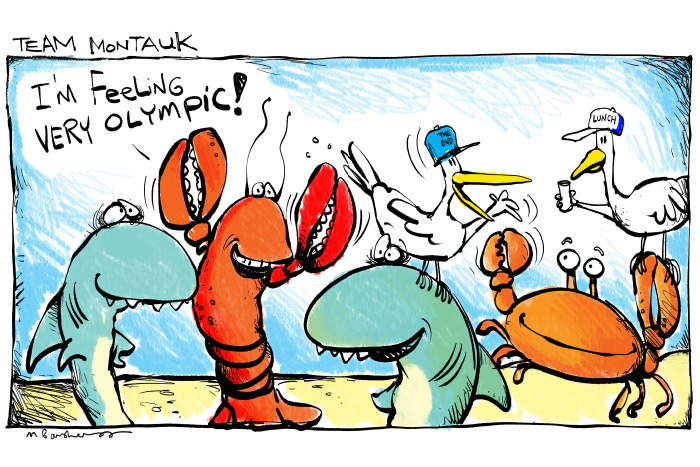Team Montauk at the Olympics

If you have been watching the Olympics on TV this week, you may be wondering why you haven’t seen any coverage of Team Montauk, which sent a large contingent of athletes to Rio in a wide variety of events. You probably think that was because Montauk is just 20 square miles in size and the contingent was so small the team got eliminated early in the preliminaries, and you would have been right about that, at least in one case.
In other events however, Montauk athletes were prevented from competing, not because of any doping charge–there was no doping–but because Montauk failed to prove it was a country. It was the first time in Olympic History that an athletic contingent, approved to be sent to the games, was asked not to compete once they got there because they were not a country. In fact, the paperwork certifying that it is a country just came too late.
The event that Montauk athletes did compete in, Men’s Beach Volleyball, took place on the second day of the Olympics–Montaukers walked proud onto the track under their flag on opening day–but the team from Belgium made short work of them, 25-0, 25-0 and 15-1 in just 20 minutes, which is surprising because Belgium has few beaches–but the Montaukers did well for themselves, with Eric Campbell setting up a tremendous spike by Noah Syndergaard, taking Belgium completely by surprise just before the end.
The Montauk women’s team, with its stars Rene Rivera and Wilma Flores, were scheduled next out on the court when the suits with the cease and desist arrived to say, in Portuguese, that the Montauk Women’s first game was forfeited because the team had to be withdrawn. It’s scheduled opponent, Madagascar, was disappointed too.
Still, Montauk made it to the Olympics, with one loss (Belgium got knocked out in the next round) and one forfeiture to its credit. Also the whole team, consisting of 17 men and women in a wide variety of categories, did get to stay at the Olympic Village and play for practice with some of the other entrants.
Swimmer Addison Reed, who would have swum in the Men’s 400, practiced with, among others, Michael Phelps and, according to Addison, actually beat him three out of five, although Phelps said he was not actually trying.
On the women’s side, Kelly Johnson and T.J. Rivera swam with Katie Ledecki who they said swam like the wind and left them proverbially in the dust every time.
As for Montauk’s surfing team, which was put together after the Montauk Open at Ditch Plains earlier in the summer, they were disappointed to learn, after they got there, that there was no surfing competition because surfing is not yet an Olympic sport. Still, Carlos Torres, Kevin Plawecki and Neil Walker on the men’s side and Akeel Morris, Ty Kelly and Hansel Robles on the women’s side enjoyed surfing the waves at the famous Copacabana Beach in that town, and, they say, soundly beat the locals.
Others who made the team and came to Rio as coaches (from the Montauk School) or as athletes included Dario Alvarez, tennis; Yoenis Cespedes, sailing; Jeurys Familia, gymnastics; Jacob deGrom, fishing; and Bartolo Colon and Steven Matz, tennis doubles. All had a good time. But all were disappointed after going through all their training.
Montauk declared itself an independent state on January 7, 2016, and submitted its application to the United Nations for membership at that time. It also sent its declaration to Sheldon Silver, the Leader of the New York State Assembly, but that was returned to Montauk unopened with a note saying that Silver had been forced out, was then arrested, convicted and sentenced. So that was the hold up.
The flag of Montauk, a crossed fishing pole and surfboard in black on a yellow background, flies now atop the pole on the Montauk Town Green. They fire a cannon at sunset there.



